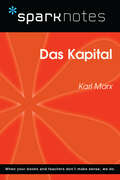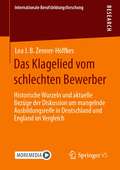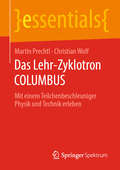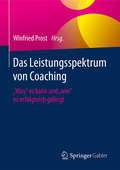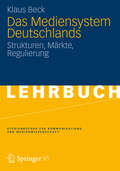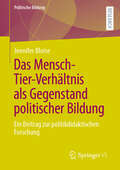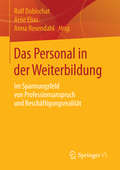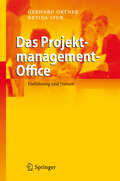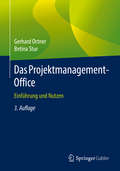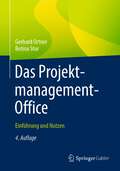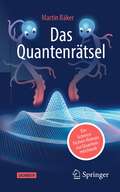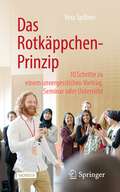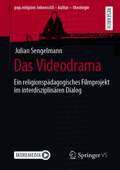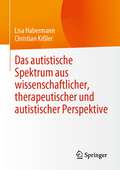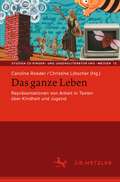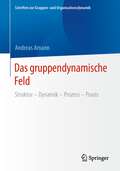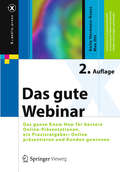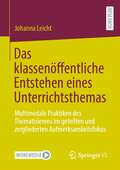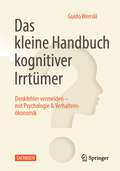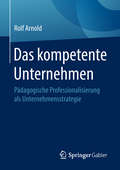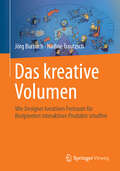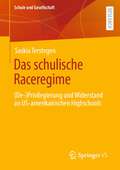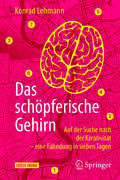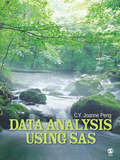- Table View
- List View
Das Kapital (SparkNotes Philosophy Guide)
by SparkNotesDas Kapital (SparkNotes Philosophy Guide) Making the reading experience fun! SparkNotes Philosophy Guides are one-stop guides to the great works of philosophy–masterpieces that stand at the foundations of Western thought. Inside each Philosophy Guide you&’ll find insightful overviews of great philosophical works of the Western world.
Das Klagelied vom schlechten Bewerber: Historische Wurzeln und aktuelle Bezüge der Diskussion um mangelnde Ausbildungsreife in Deutschland und England im Vergleich (Internationale Berufsbildungsforschung)
by Lea J. Zenner-HöffkesDas Buch liefert in internationaler wie historischer Perspektive empirische Befunde für die Beantwortung der Frage, ob Ausbildungsreife ein interessenpolitisch genutztes Konstrukt darstellt und ob ein Zusammenhang der genutzten Narrative mit der Lage auf dem Ausbildungsstellenmarkt besteht. Während die Frage für den deutschen Kontext bejaht werden kann, wird sie für den englischen Kontext verneint. Die Ergebnisse zeigen somit eine hohe Abhängigkeit der nationalen Diskurse von den länderspezifischen Rahmenbedingungen.
Das Lehr-Zyklotron COLUMBUS: Mit einem Teilchenbeschleuniger Physik und Technik erleben (essentials)
by Martin Prechtl Christian WolfDas essential beschreibt die Planung und Konzeption sowie den Bau und Einsatz eines kleinen Beschleunigers, der in erster Linie Schul- und Lehrzwecken dient. Neben einer Funktionsbeschreibung wird insbesondere auf diejenigen Teilsysteme eingegangen, die für den Betrieb eines Zyklotrons notwendig sind. Das essential vermittelt also dem Leser in nachvollziehbaren Schritten einen vertieften Einblick in die Funktion und das Zusammenwirken aller Komponenten eines Zyklotrons. COLUMBUS ist aber nicht nur ein Zyklotron FÜR, sondern auch eines VON Schülern und Studenten, die in jeder Phase in die Entwicklung und den Bau miteinbezogen wurden. Im essential wird dies durch den teilweise verwendeten Dialogstil an den entsprechenden Stellen zum Ausdruck gebracht.
Das Leistungsspektrum von Coaching: "Was" es kann und "wie" es erfolgreich gelingt
by Winfried ProstDieses Buch vermittelt anschaulich in elf fundierten Beitr#65533;gen erfahrener Coaches die Bandbreite der erfolgreichen Coachingarbeit. Coaches sind Diagnostiker. Sie untersuchen Lebenssituationen, Handlungsstrategien, Verhaltensmuster und werden konsultiert, wenn irgendetwas nicht so l#65533;uft wie erw#65533;nscht. Ganzheitlich arbeiten bedeutet dann, den #65533;berblick zu gewinnen und L#65533;sungen zu finden. Dabei k#65533;nnen Coaches technisch genauso exakt vorgehen wie ein Mechaniker oder Chirurg. Dieses Buch berichtet von den psychologischen Methoden, die sich in vielen F#65533;llen bew#65533;hrt haben. Eine spannende Lekt#65533;re mit vielen konkreten Tipps f#65533;r Coaches wie auch f#65533;r Klienten.
Das Mediensystem Deutschlands: Strukturen, Märkte, Regulierung (Studienbücher zur Kommunikations- und Medienwissenschaft)
by Klaus BeckDiese Einführung bietet eine historisch fundierte (ab 1945) systematische Darstellung der Grundstrukturen des bundesdeutschen Mediensystems und seiner kommunikationspolitischen Genese, insbesondere der ökonomischen, rechtlichen und technischen Grundlagen und Funktionsweisen der Medien der öffentlichen Kommunikation Printmedien, Rundfunk, Film, Online-Medien) sowie der medien-übergreifenden Strukturen/ Rahmenbedingungen (Nachrichten-, PR- und Werbeagenturen) sowie TK-Dienstleister. Darüber hinaus werden komparatistische Bezüge zu den Mediensystemen Österreichs und der Schweiz sowie Basisinformationen zu diesen beiden Mediensystemen hergestellt.
Das Mensch-Tier-Verhältnis als Gegenstand politischer Bildung: Ein Beitrag zur politikdidaktischen Forschung (Politische Bildung)
by Jennifer BloiseZiel dieses Buchs ist es, das Mensch-Tier-Verhältnis als neuen Gegenstand politischer Bildung zu erschließen und reflexiv zugänglich zu machen. Dabei ist eine leitende These, dass das gesellschaftliche Verhältnis zu Tieren politisch und problematisch ist, da es von Machtstrukturen durchzogen ist und als Teil einer unreflektierten Normalität selten als Problemfeld erkannt wird. Zur Erschließung wird das Modell der politikdidaktischen Rekonstruktion genutzt. Eine problemzentrierte Interviewstudie dient der Rekonstruktion lebensweltlicher Vorstellungen von Schüler*innen über Tiere, Menschen und ihr (politisches) Verhältnis zueinander. Diese werden mit wissenschaftlichen Perspektiven (insbesondere der Human-Animal Studies) in ein Verhältnis gesetzt, um Widersprüche und Selbstverständlichkeiten aufzudecken und um schließlich exemplarische politikdidaktisch fruchtbare Zugänge zum Gegenstand auszuloten. Die Autorin kommt zur Erkenntnis, dass eine künftig mögliche Auseinandersetzung mit dem Mensch-Tier-Verhältnis im Kontext politischer Bildung machtkritisch gestaltet werden sollte, um – im Sinne eines Sichtbarmachens von Unsichtbarem – reflektiertes und mehrperspektivisches politisches Urteilen über das Mensch-Tier-Verhältnis zu ermöglichen.
Das Personal in der Weiterbildung: Im Spannungsfeld von Professionsanspruch und Beschäftigungsrealität
by Rolf Dobischat Anna Rosendahl Arne EliasDer Band thematisiert Entwicklung, Stand und Folgen der Besch#65533;ftigungsbedingungen, der Professionalisierung und der Professionalit#65533;t des Weiterbildungspersonals. Untersucht und kritisch analysiert werden die Interdependenzen dieser Facetten aus der Perspektive von Wissenschaft, Praxis und interessenpolitischen Akteuren.
Das Projektmanagement-Office: Einführung und Nutzen
by Gerhard Ortner Betina SturIn projektorientierten Unternehmen spielen Projektmanagement-Offices (PMO) eine immer wichtigere, manchmal sogar zentrale Rolle, wenn es darum geht, die Projektmanagementaktivitäten des Unternehmens zielgerichtet und effizient auszurichten. Dabei entstehen unternehmensspezifisch Organisationen mit teilweise recht unterschiedlichen Aufgaben, Funktionen und organisatorischen Rahmenbedingungen. Das Buch soll einen kompakten Überblick über die Möglichkeiten, die ein PMO bietet und die Ausprägungen, wie es implementiert werden kann, geben.
Das Projektmanagement-Office: Einführung und Nutzen
by Gerhard Ortner Betina SturMeistern Sie unternehmerische Herausforderungen mit Hilfe eines PMOs – Dieses Buch zeigt, wie es gehtDieses Buch über das Projektmanagement-Office veranschaulicht aus theoretischer und praktischer Sicht, weshalb ein PMO ein Erfolgsfaktor für unternehmerische Herausforderungen ist. In acht Kapiteln zeigen Prof. (FH) Dr. Gerhard Ortner und Mag. (FH) Betina Stur, was für die Einführung eines PMOs spricht und welche organisatorischen Aufgaben bei der Einführung anfallen. Die 14 Fallbeispiele dieser dritten Auflage zeigen Ihnen, wie sich ein PMO effektiv auf Ihre Arbeitsweise auswirkt.Verwalten Sie Ihre Projekte mittels guter Planung noch effizienter In projektorientierten Unternehmen spielt die Projektverwaltung eine zunehmend wichtigere Rolle, vor allem, um die Projektmanagementaktivitäten zielgerichtet und effizient auszurichten. Dabei entstehen oft neue Aufgaben und Funktionen und veränderte Rahmenbedingungen, auf die Sie flexibel reagieren müssen. Dieses Buch zeigt Ihnen, wie Sie sich den folgenden Herausforderungen mit Hilfe eines Projektmanagement-Office erfolgreich stellen: AgilitätNachhaltigkeitVeränderte RollenVerantwortung der FührungskräfteHier erfahren Sie, wie sich ein agiles Projektmanagement-Office positiv auf Ihre Arbeitsweise auswirkt und erhalten einen detaillierten Überblick über die unterstützende Wirkung eines PMOs. Die vorliegende Ausgabe enthält zudem wichtige Neuerungen über die Funktionen, Positionierung und Verantwortlichkeiten innerhalb eines Multiprojektmanagements.
Das Projektmanagement-Office: Einführung und Nutzen
by Gerhard Ortner Betina SturIn projektorientierten Unternehmen spielen Projektmanagement-Offices (PMO) eine wichtige, manchmal sogar zentrale Rolle, wenn es darum geht, die Projektmanagementaktivitäten des Unternehmens zielgerichtet und effizient auszurichten. Dabei entstehen unternehmensspezifisch Organisationen mit teilweise recht unterschiedlichen Aufgaben, Funktionen und organisatorischen Rahmenbedingungen. Die Profession Projektmanagement ist natürlich auch Veränderungen und neuen Entwicklungen unterworfen. Themen wie Agilität, Nachhaltigkeit oder neue bzw. veränderte Rollen sind Herausforderungen, denen sich PMO der Gegenwart und Zukunft stellen müssen. Das Buch soll einen kompakten Überblick über die Möglichkeiten, die ein PMO bietet, und die Ausprägungen, wie es implementiert werden kann, geben. Die vierte Auflage wurde erweitert um Informationen zur Integration von KI-Technologien und Projektgovernance-Strukturen sowie zwei zusätzliche Fallbeispiele von PMO-Implementation.
Das Quantenrätsel: Ein Science-Fiction-Roman zur Quantenmechanik
by Martin BäkerZwei Außerirdische beobachten auf ihren jeweiligen Heimatplaneten die Landung eines Raumfahrzeugs und versuchen, es zu erforschen. Im Inneren entdecken sie rätselhafte Experimente, die ihnen zeigen, dass die Welt sich nicht so verhält, wie sie es angenommen haben, und die ihr gesamtes Verständnis der Realität in Frage stellen. Die Vorgeschichte der Raumfahrzeuge enthüllt schließlich eine Bedrohung von galaktischem Ausmaß, die nur mit Hilfe der Quantenmechanik überwunden werden kann.Dieses Sachbuch in Form eines Science-Fiction-Romans führt erzählerisch und spannend in die Konzepte der Quantenmechanik ein. Zentrale Begriffe wie Welle-Teilchen-Dualismus, Verschränkung und Schrödingers Katze werden an nachvollziehbaren (Gedanken-)Experimenten erläutert.
Das Rotkäppchen-Prinzip: 10 Schritte zu einem unvergesslichen Vortrag, Seminar oder Unterricht
by Vera SpillnerIn diesem Buch zeigt Ihnen Vera Spillner auf unterhaltsame und anschauliche Weise, wie Sie in 10 einfachen Schritten wirkungsvolle Vorträge, Workshops, Seminare oder Vorlesungen gestalten können, die im Gedächtnis bleiben. Was war die letzte Veranstaltung, der letzte Workshop, das letzte Seminar, das Sie besucht haben? Um welches Thema ging es? Und woran liegt es, wenn es Ihnen wie den meisten geht und Sie sich kaum erinnern können? Die Erfahrung zeigt: Schuld sind nicht die Inhalte, und auch eher selten der oder die Vortragende. Schuld ist die Form.Dieses Buch richtet sich an alle, die im beruflichen oder privaten Kontext über Themen sprechen möchten, die ihnen am Herzen liegen und wollen, dass ihr Thema ankommt.Das Geheimnis: machen Sie es zu einem Ereignis und erzählen Sie eine Geschichte. Bauen Sie ein Narrativ ein und erwecken Sie Emotionen. Kompliziert? Kein bisschen. Wie das geht, zeigt Ihnen die Vera Spillner am konkreten Beispiel einer eigenen Veranstaltung – ganz nach dem „Rotkäppchen-Prinzip“, indem Sie Ihren Vortrag in eine spannende Geschichte verwandeln.Aus dem Inhalt Wie Sie mit Storytelling und klugen Narrativen ihre Zuhörer gewinnenWarum Charaktere und Spannungsbögen für einen guten Vortrag so wichtig sindWie Sie Charaktere entwickeln, die im Gedächtnis bleibenWie Sie in 10 Schritten alles für Ihren Vortrag, Workshop oder Seminar vorbereiten
Das Videodrama: Ein religionspädagogisches Filmprojekt im interdisziplinären Dialog (pop.religion: lebensstil – kultur – theologie)
by Julian SengelmannDas religionspädagogische und praktisch-theologische Projekt VIDEODRAMA ist ein hybrider, interdisziplinärer Ansatz, bei dem mit einer Gruppe in einem kreativen Prozess ein Film produziert wird, der im „Raum eines biblischen Textes“ entsteht. Die Teilnehmenden entwickeln diese Filmerzählung in allen Facetten einer klassischen Filmproduktion bis hin zur Premiere in einem Kino. Das VIDEODRAMA ist ein interdisziplinäres Projekt, das sich dezidiert von wissenschaftlichen Konkurrenzen und Konzeptionen loslöst. Dieses Buch begleitet exemplarisch einen solchen Prozess, entwickelt eine Theorie des VIDEODRAMAS und bringt diese mit ausgewählten aktuellen religionspädagogischen Diskussionen ins Gespräch.
Das autistische Spektrum aus wissenschaftlicher, therapeutischer und autistischer Perspektive
by Lisa Habermann Christian KißlerDas autistische Spektrum aus wissenschaftlicher, therapeutischer und autistischer Perspektive
Das ganze Leben – Repräsentationen von Arbeit in Texten über Kindheit und Jugend (Studien zu Kinder- und Jugendliteratur und -medien #12)
by Caroline Roeder Christine LötscherArbeit bedeutet im 21. Jahrhundert nicht (mehr) das sprichwörtliche ›halbe Leben‹, sondern erstreckt sich heute in zunehmender Entgrenzung auf alle Lebensbereiche. Der vorliegende Band umfasst 20 Beiträge und stellt die Untersuchung von Repräsentationen von Arbeit in Kindheit und Jugend erzählenden Texten sowie im Textkorpus der Kinder- und Jugendliteratur in den Mittelpunkt. Die historisch wie kulturwissenschaftlich ausgerichteten Ansätze eröffnen neue Blickwinkel; mediale wie populärkulturelle Fragestellungen erweisen sich als zentrale, weiterführende Arbeitsfelder.
Das gruppendynamische Feld: Struktur – Dynamik – Prozess – Praxis (Schriften zur Gruppen- und Organisationsdynamik #14)
by Andreas AmannDieses Buch geht von einigen wenigen Zentralkonzepten aus, die bis heute zum normativen Kernbestand der angewandten Gruppendynamik gehören und legt mit deren Hilfe die Besonderheit des gruppendynamischen Feldes frei. Laboratorium, Trainingsgruppe, Hier und Jetzt-Prinzip sowie Minimalstrukturierung bilden zusammen den strukturellen Rahmen gruppendynamischer Praxis: den gruppendynamischen Raum. Aufbauend auf dieser Strukturrekonstruktion werden Dynamik, Prozess und Praxis der Gruppendynamik – das gruppendynamische Feld - dargestellt.
Das gute Webinar: Das ganze Know How für bessere Online-Präsentationen, ein Praxisratgeber: Online präsentieren und Kunden gewinnen (X.media.press)
by Anita Hermann-Ruess Max OttIn diesem Buch lernen Sie anschaulich und praxisnah, wie Sie ein gutes Webinar organisieren, produzieren und live durchführen.Sie erhalten Antworten auf die Fragen: Was sind Webinare überhaupt? Wie können Sie das Format „Webinar“ in Ihrem Unternehmen sinnvoll einsetzen? Welche Technik benötigen Sie für gute Webinare? Wie produzieren Sie Präsentationen onlinegerecht? Wie halten Sie ein Webinar überzeugend und fesselnd live? Wie nutzen andere Unternehmen und Organisationen dieses Format heute schon erfolgreich?Sechs Kapitel führen Sie in die Welt der Webinare ein mit vielen Materialien, Checklisten, Plänen und Inspirationshilfen. Auf einer extra Website zum Buch erhalten Sie die wichtigsten Vorlagen zum Herunterladen, ein Bonuskapitel zum Thema Onlinemarketing, Beispiel-Webinare zum Anschauen und viele weitere Informationen.
Das klassenöffentliche Entstehen eines Unterrichtsthemas: Multimodale Praktiken des Thematisierens im geteilten und zergliederten Aufmerksamkeitsfokus
by Johanna LeichtBezogen auf den Schulunterricht fragen sowohl die Allgemeine Didaktik als auch die verschiedenen Fachdidaktiken nach den Inhalten, mit denen Lehrende und Lernende einen spezifisch vermittelten „Out-Put“ erreichen sollen. Offen bleibt jedoch, wie und als was konkret diese Inhalte in der alltäglichen Unterrichtsinteraktion zum Thema werden. Hier setzt das Forschungsvorhaben an und geht ganz grundsätzlich davon aus, dass Unterrichtsthemen nicht vorgängig vorhanden sind. Stattdessen entstehen Themen – so die Annahme – in komplexen Praktiken zwischen räumlich situierten Körpern und Dingen. Als „Unterrichtsthema“ werden somit empirisch rekonstruierte Themen der sozialen Situation „Unterricht“ bezeichnet, die Bezüge zu in Lehrplänen normativ gesetzten Lehr-Lern-Inhalten aufweisen. Diese bilden den Fokus des Dissertationsprojekts, welches danach fragt, wie sich ein Unterrichtsthema bildet. Das Forschungsinteresse bezieht sich dabei nicht auf das rein sprachliche, sondern auf das multimodale Geschehen im Deutschunterricht der Klassen 10 und 11, welches videographisch erhoben wurde, um Praktiken des Thematisierens sowie die Entstehung von Unterrichtsthemen zu rekonstruieren.
Das kleine Handbuch kognitiver Irrtümer: Denkfehler vermeiden – mit Psychologie & Verhaltensökonomik
by Guido Wenski„Irren ist menschlich" – das alte Sprichwort wird auch durch die Wissenschaft bestätigt: Uns Menschen unterlaufen ständig Denkfehler. Dieses Buch stellt über 300 solcher kognitiver Irrtümer und Verzerrungen, die im Alltag auf uns lauern, auf unterhaltsame Art vor: Ob trügerische Erinnerungen, Beeinflussung unserer Entscheidungen durch Gefühle, Phänomene der Selbstüberschätzung, falscher Umgang mit Geld oder Wahrscheinlichkeiten oder sogar Sichtweisen, die zu Diskriminierung führen – unser komplexes Gehirn neigt zu vorhersagbaren Schnellschüssen, die in der Vorzeit eine Grundvoraussetzung zur Erhaltung unserer Art waren, in heutiger Zeit aber fatale Folgen haben können. Doch es gibt Hoffnung, denn Psychologie und Verhaltensökonomik bieten neben Erklärungsansätzen auch Hinweise zum Umgang mit kognitiven Irrtümern aller Art. Mit diesem Baukasten und zahlreichen Tipps lassen sich falsche Entscheidungen vermeiden. Und so ist dieses kleine Handbuch menschlicher Denkfehler gleichzeitig ein Ratgeber für den täglichen „Hürdenlauf" durch unseren komplizierten Alltag.
Das kompetente Unternehmen: Pädagogische Professionalisierung Als Unternehmensstrategie
by Rolf ArnoldIn diesem Buch erfahren Führungskräfte und Berufscoaches, wie sie betriebliche Lern-, Kooperations- und Führungsstrukturen transformieren und die Kompetenzentwicklung der Organisation vom einzelnen Mitarbeiter aufwärts optimieren können. Im Fokus steht das proaktive und eigenständige Erkennen, Formen und Fördern von geistigen, sozialen und persönlichen Potenzialen, die für die Entstehung eines kompetenten Unternehmens essentiell sind.Denn lebenslanges Lernen ist das Motto unserer Zeit. Es gilt nicht nur für die einzelne Person, sondern auch für Organisationen. Unternehmen, die beständig und erfolgreich bleiben möchten, müssen sich zu lernenden Unternehmen entwickeln. Personalverantwortliche können daher nicht länger nur punktuell Verantwortung für Weiterbildungsmaßnahmen übernehmen, sondern müssen ständige Bildungsbegleiter der Mitarbeiter und Planer von Personalentwicklungsstrategien werden. Dieses Buch zeigt die erforderlichen Maßnahmen hierfür auf.
Das kreative Volumen: Wie Designer kreativen Freiraum für Rezipienten interaktiver Produkte schaffen
by Jörg Burbach Nadine TrautzschWie weit kann ein Spiel gehen, um uns in seine Welt eintauchen zu lassen? Das theoretische Modell des Kreativen Volumens betrachtet dazu alle narrativen und ludischen Elemente in ihrer Gesamtheit. Dieses Konzept lässt sich auf das Entwickeln und Erleben von Videospielen anwenden, indem es nicht nur Immersion und Einfühlung, sondern auch die subtile Kunst des Weglassens betont. Das Buch vereint disziplinübergreifende Ansätze, um kreative Prozesse sowohl auf Seiten der Entwickler:innen als auch der Spieler:innen zu fördern. Kern des Modells sind die drei Dimensionen: Kreatives Fundament (durch die Entwickler:innen gestaltete Elemente), Kreatives Potenzial (die schöpferische Interaktion der Spieler:innen) und Kreative Resonanz (Auswirkungen des Spiels über dessen Grenzen hinaus).Es bietet praxisorientierte Leitlinien, wie gestalterische Entscheidungen die emotionale, narrative und soziale Interaktion im Spiel formen können. Es zeigt auf, wie durch bewusste Gestaltung Freiräume für kreative Entfaltung geschaffen und reflektiert werden können und wir somit Spiele zu kulturellen Artefakten und Resonanzräumen entwickeln können. Mit Blick auf die zunehmende Komplexität interaktiver Produkte schafft das kreative Volumen ein Vokabular und einen Rahmen, um Spielentwicklung strategischer, wirkungsvoller und inspirierender zu gestalten. Die Zielgruppe umfasst Game Designer:innen, Entwickler:innen, Künstler:innen und Forscher:innen, die ihr Verständnis von kreativer Interaktivität vertiefen und die gestalterische Praxis auf ein neues Level heben möchten. Begleitmaterial unter https://www.kreatives-volumen.de
Das schulische Raceregime: (De-)Privilegierung und Widerstand an US-amerikanischen Highschools (Schule und Gesellschaft #69)
by Saskia TerstegenFür US-amerikanische Schulen wurden seit der Bürgerrechtsbewegung Antidiskriminierungsgesetze und -strategien entwickelt bzw. erkämpft, doch bleibt Rassismus für sie weiterhin ein wirkmächtiges Phänomen. In einer ethnographischen Diskursanalyse untersucht Saskia Terstegen, welche Bedeutsamkeit der Differenzdimension Race in der Schule für die (De-)Privilegierung von Schüler:innen, Lehrer:innen und Adminstrator:innen zukommt. Hierfür werden subjektivierungs-, diskurs- und rassismustheoretische Perspektiven auf Race, whitenessund Widerstand entwickelt. Auf Basis von Daten, die an zwei Highschools zur Zeit der Wahl Donald Trumps zum Präsidenten der USA entstanden sind, wird herausgearbeitet, wie whiteness als schulische Norm anerkannt und herausgefordert wird. Mit dem Konzept des schulischen Raceregimes unterbreitet die Studie einen machttheoretischen Vorschlag, um das Verhältnis der Stabilisierung und Irritation von Rassismus in der Schule vor dem Hintergrund pädagogischer Verhältnisse zu fassen.
Das schöpferische Gehirn: Auf der Suche nach der Kreativität – eine Fahndung in sieben Tagen
by Konrad LehmannDas Geheimnis des Geistesblitzes – entschlüsselt Dieses Buch ist eine Einladung zu einer aufregenden Spurensuche: Erkunden Sie Schritt für Schritt die neuronalen Grundlagen der menschlichen Kreativität. Sie werden dabei unweigerlich einige Überraschungen erleben. Die Kulturgeschichte des Menschen ist nicht zuletzt die Geschichte großer Gedanken und genialer Neuerungen – und damit die Geschichte geistsprühender Gehirne. Seit wenigen Jahren erst ergründen die Neurowissenschaften, was in solchen Gehirnen vorgeht, wenn sie neue Ideen hervorbringen und verwirklichen. Der erfahrene Hirnforscher Konrad Lehmann gewährt uns einen ebenso unterhaltsamen wie informativen Einblick in diese fesselnde Forschungsrichtung: Was ist eine kreative Persönlichkeit? Sind Genies wirklich verrückt? Woher kommt der Antrieb, kreativ zu sein? Welche Gehirngebiete sind aktiv, wenn wir rappen oder jazzen? Und welche, wenn wir eine zündende Idee haben? Warum kommen die besten Einfälle im Schlaf? Die Suche nach der Kreativität im Gehirn ist spannend wie ein Krimi. Begleiten Sie den Autor und Commissario Prefrontale auf einer doppelten Fahndung: in den Gassen einer sich verändernden Stadt und durch die dunklen Windungen des Gehirns.___"Das schöpferische Gehirn" ist die erste deutschsprachige Einführung in die neurobiologische Kreativitätsforschung, die sich an ein allgemeines Publikum richtet. Das Buch vereint wissenschaftliche Sorgfalt, kulturelle Bildung und stilistisches Feuer. Komplexe Zusammenhänge werden unterhaltsam und bildhaft vermittelt, wozu die allegorische Rahmenhandlung beiträgt.
Dash (Breyer Stablemates)
by J. Elizabeth MillsWhen Jenny discovers barrel racing, she cannot wait to give it a try. Luckily, Jenny's dad has the perfect horse, Dash. Dash is very fast, but Jenny must learn to control him around all the tight turns in the barrel racing course.
Data Analysis Using SAS
by Dr Chao-Ying Joanne PengData Analysis Using SAS offers a comprehensive core text focused on key concepts and techniques in quantitative data analysis using the most current SAS commands and programming language. The coverage of the text is more evenly balanced among statistical analysis, SAS programming, and data/file management than any available text on the market. It provides students with a hands-on, exercise-heavy method for learning basic to intermediate SAS commands while understanding how to apply statistics and reasoning to real-world problems. Designed to be used in order of teaching preference by instructor, the book is comprised of two primary sections: the first half of the text instructs students in techniques for data and file managements such as concatenating and merging files, conditional or repetitive processing of variables, and observations. The second half of the text goes into great depth on the most common statistical techniques and concepts - descriptive statistics, correlation, analysis of variance, and regression - used to analyze data in the social, behavioral, and health sciences using SAS commands. A student study at www.sagepub.com/pengstudy comes replete with a multitude of computer programs, their output, specific details on how to check assumptions, as well as all data sets used in the book. Data Analysis Using SAS is a complete resource for Data Analysis I and II, Statistics I and II, Quantitative Reasoning, and SAS Programming courses across the social and behavioral sciences and health - especially those that carry a lab component.
